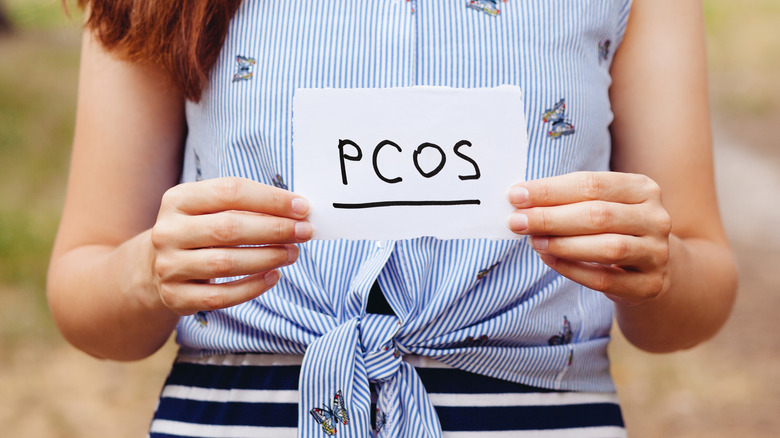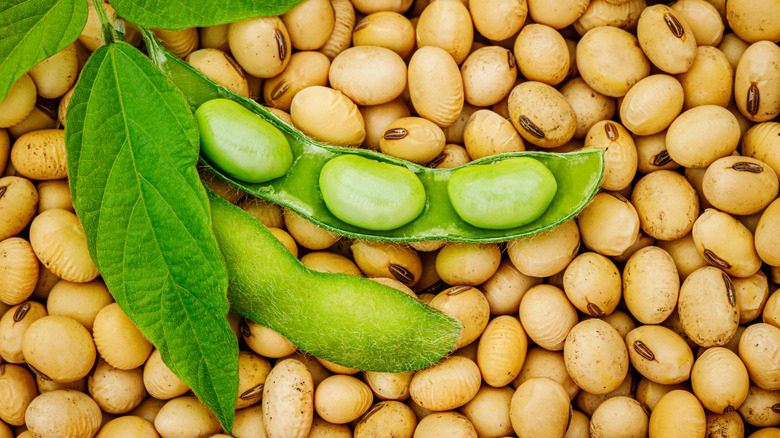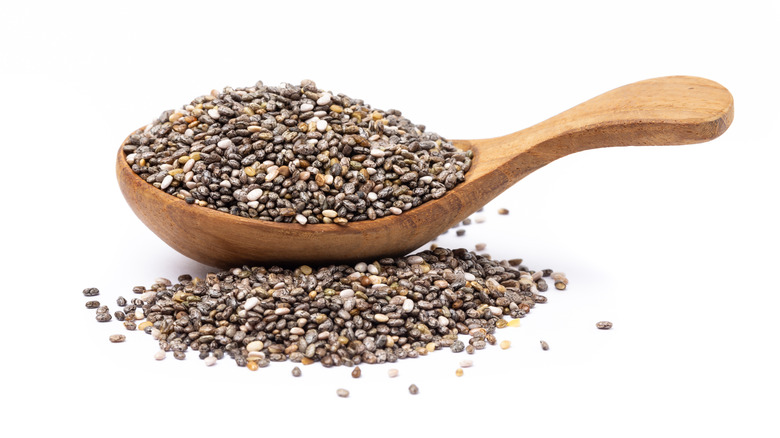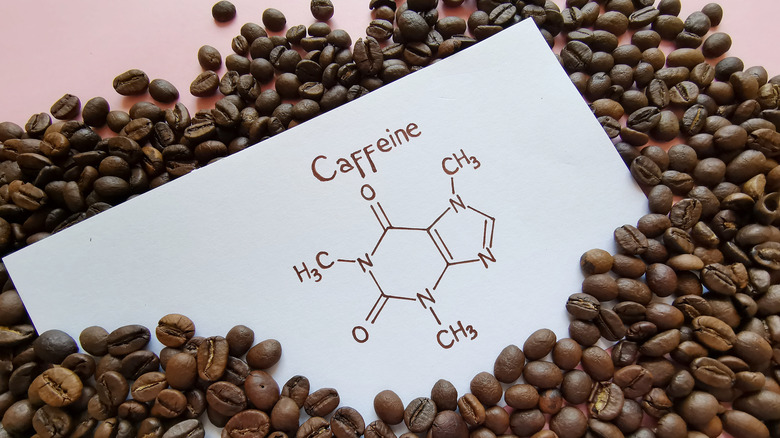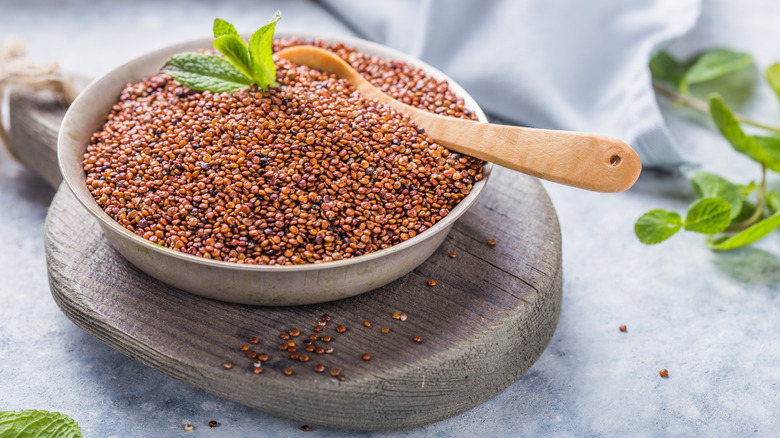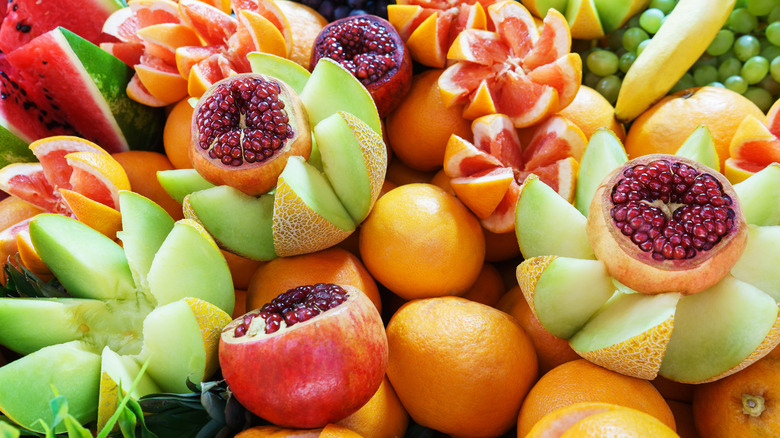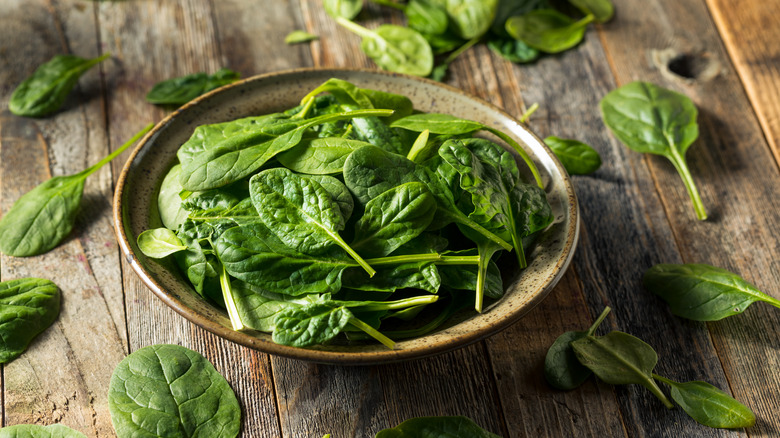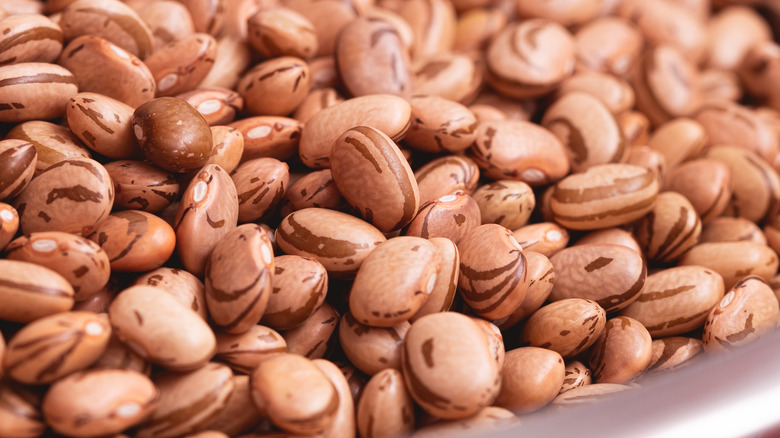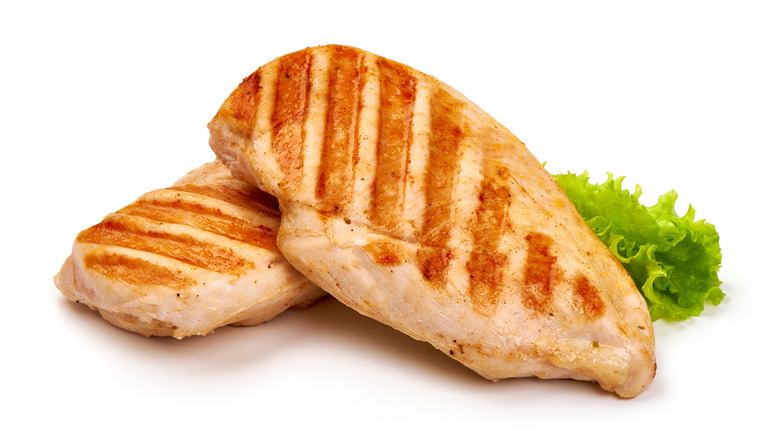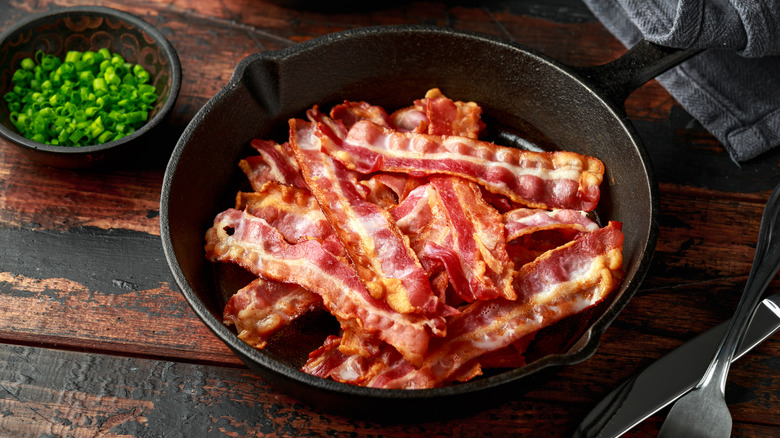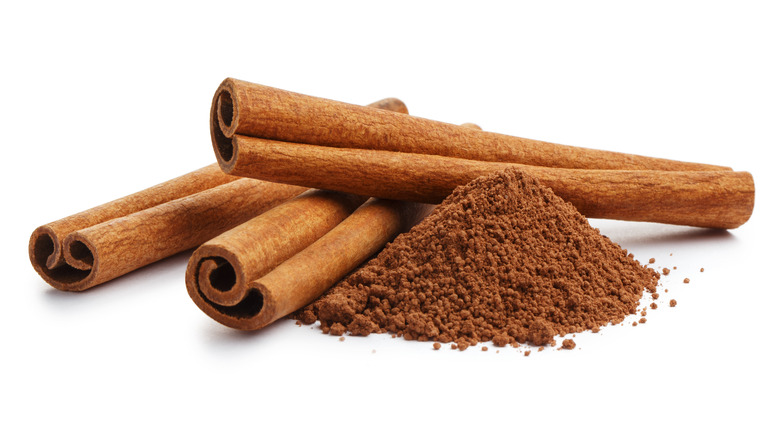7 Foods To Eat And 7 To Avoid When You Have PCOS
Imagine this: A woman is troubled by changes happening to her body. She's inexplicably gaining weight through her midriff. She's also noticing hair growing on her back and chest, and yet she's also losing hair from the top of her head. But what's concerning her the most is her period has become irregular. What she doesn't realize is all of these symptoms could be red flags that she has polycystic ovary syndrome, or PCOS (via Johns Hopkins Medicine).
As its name suggests, PCOS is when sacs filled with fluid (cysts) form inside of a woman's ovaries in connection to hormonal imbalances. Keep in mind, there's a specific hormone combination needed for ovulation. If a woman's body doesn't produce enough of the correct hormones, then cysts can form and create larger amounts of male sex hormones called androgens, which can lead to symptoms like the ones in the above scenario.
At this time, we're still connecting the dots as to what causes PCOS, but data supports that the odds of developing it go up if someone is insulin resistant or obese. Remember, the body's cells use the hormone insulin to process sugar (via WebMD). When the cells don't use insulin as efficiently as they should, the pancreas tries to compensate by producing more insulin, which can lead to the production of more androgens and weight gain (via Healthline). Fortunately, dietary changes can help manage insulin resistance, weight, and PCOS.
Eat: Pumpkin
Pumpkins are arguably one of the most popular winter squashes. When fall arrives in certain parts of the world, it suddenly seems like everything from pastries to coffees are bursting with pumpkin flavor. But what many people don't realize is adding a little more pumpkin to their diet might help manage both blood sugar and PCOS (via Healthline).
As Healthline explains, pumpkins are naturally high in fiber. In fact, one cup of canned pumpkin packs a whopping 7 grams of fiber (via Healthline and United States Food and Drug Administration). Okay, but why does that help with insulin resistance, a condition tied to sugar, not fiber? Well, it comes down to one simple fact: The faster you digest something, the more likely it is to spike your blood sugar. But the longer your digestive system has to work at breaking down a food, the slower the sugar from it will enter your bloodstream. And foods that contain fiber — like pumpkins — force your body to digest meals and snacks less quickly, thereby keeping your sugar levels steadier (via Healthline). In turn, this helps those with PCOS manage their symptoms.
In addition, pumpkins are also low in calories, making them a potentially good addition to your diet if you're concerned about weight management — an added perk for those with PCOS, who can have trouble controlling their weight (via Healthline).
Avoid: Soy
Sorry to anyone who enjoys dipping their sushi in soy sauce — but products made from soybeans are not recommended if you have PCOS. As MedicineNet explains, soy can inhibit the thyroid from optimal functioning, which can worsen some symptoms associated with PCOS.
According to the Mayo Clinic, the hormones the thyroid makes are essential for everything from your heart rate and blood pressure to your body temperature and metabolism. Soy, however, can contain "goitrogenic compounds," which might increase your chances of developing a type of growth called a goiter in your thyroid (via MedicineNet and Science Direct). This, of course, can throw off your thyroid — which in turn can exacerbate problems such as weight gain and bloating that are common in those with PCOS.
If you develop a goiter, contact your healthcare professional right away. And remember that soy may not always be clearly marked as such on food labels — products with the ingredients TSP (Textured Soy Protein) and/or TVP (Textured Vegetable Protein) contain soy (via University of California San Francisco). Other foods made from soy include miso, tempeh, and sometimes meat alternatives. In addition, soy sauces also go by names like shoyu, teriyaki, and tamari, depending on how they are made.
Eat: Chia seeds
Did you know that peppermint and chia seeds are closely related? According to WebMD, Salba chia (also known as Mexican chia) is in the mint family. Of course, chia seeds will probably never replace its plant cousin in candies like starlight mints, but what they lack in minty flavor, they more than make up for in their possible healthy impact on your body, especially if you have PCOS.
As WebMD explains, chia seeds are an excellent source of fiber and so can be recommended additions to a PCOS-friendly diet. Remember, consuming fiber can prevent your body from digesting food quickly, which in turn can keep your blood sugar from spiking (via Healthline). And when blood sugar levels don't fluctuate dramatically, it reduces the chances of developing insulin resistance. This might reduce your odds of developing conditions like PCOS, or help manage PCOS-related symptoms.
Besides helping control blood sugar spikes, the type of fiber in chia seeds can help you feel fuller longer after a meal, which can help with weight management (via WebMD). Data also indicates that chia seeds contain an antioxidant that might help reduce inflammation, and according to Healthline, foods that decrease inflammation can help with PCOS. In addition, the antioxidants in chia seeds can potentially reduce the risk of certain cancers and heart problems (via WebMD).
Avoid: Too much caffeine
Don't worry. You don't have to throw away your coffee mug — just maybe use it less often. According to a paper published in Epidemiology, more research is needed to fully understand the effect of caffeine on women's bodies, including their ovaries and fertility. The Mayo Clinic's website recommends women concerned about their reproductive health limit caffeine intake to one or two cups of coffee a day rather than cut it out entirely. However, caffeine is found in far more than a morning cup of Joe, and these sources might raise caffeine to troubling levels for someone with PCOS.
As Women's Health Magazine points out, caffeine can cause issues with ovulation. Specifically, overconsumption of caffeine could affect a woman's hormonal levels, which might impact one's menstrual cycle – one study involving 350 premenopausal women concluded that, "Habitual use of caffeine should be considered a risk factor for most menstrual abnormalities" (via Journal of Taibah University Medical Sciences).
It's no wonder that infertility specialist Dr. Jeffrey M. Goldberg recommends women with PCOS only drink caffeine in moderation (via Cleveland Clinic). But if you think skipping Starbucks will reduce your caffeine intake enough, keep in mind that caffeine is in tea, soda, chocolate, energy drinks, and pain relievers (via Harvard T.H. Chan). Plus, just because a product is decaf doesn't mean it's 100% caffeine free. According to Healthline, while the majority of caffeine is removed from decaf coffee, as much as 3% can escape the decaffeination process.
Eat: Quinoa
In the trailer for the "Animaniacs" reboot, 90s cartoon character Yakko Warner instantly learns about the 21st century by swallowing a computer tablet. Overwhelmed, he collapses, then utters "Quantum mechanics. Quinoa wraps. Queen Bey. We've missed so much!" While part of the joke is there are more important things than quinoa wraps, Yakko might have been on to something when he singled out this whole grain. After all, the United Nations was so impressed by quinoa that it made 2013 "The International Year of Quinoa" (via Healthline and Food and Agriculture Organization of the United Nations).
Quinoa can be a nutritious addition to your diet, especially if you have PCOS. As Verywell Health explains, grains like quinoa have a low glycemic index, meaning they aren't as likely to cause your blood sugar to spike (via Mayo Clinic). This, in turn, keeps your insulin levels more steady and lessens your chances of both developing type 2 diabetes and having issues related to PCOS (via WebMD). Additionally, quinoa is a great source of fiber and protein, making it a good option for weight management meal plans because it provides the double whammy of keeping you fuller for longer and boosting your metabolism (via Healthline).
Avoid: Too much fruit
The old saying "You can have too much of a good thing" applies to fruit and PCOS. Now, let's be clear. Fruit in the right amounts can be good not only for your overall health, but for PCOS (via Verywell Health). However, fruit has sugar. Natural sugar, yes — but nevertheless, sugar in high amounts can contribute to insulin resistance (via Verywell Health).
So, how much is too much? Well, this can vary from person to person, however, as Verywell Health points out, loading up a smoothie with several cups of fruit might seem like a healthy move, but can actually cause blood sugar spikes. And if you add fruit juice to the mix, that can make the situation worse, since fruit juices tend to have added sugar. Also, those with PCOS might not want to indulge in one big fruit snack first thing in the morning — a better approach would be to spread out fruit consumption throughout the day in portion-controlled amounts.
It's also important to point out that dried fruit can have as much as three times the amount of the sugar of fresh fruits (via Well+Good). So, if you want to keep fruit in your PCOS-diet, stick to eating moderate amounts of fiber-rich ones like plums and apples (via Verywell Health). And if you're not sure how much of a food is alright for your health needs, speak with your healthcare professional or a nutritionist.
Eat: Spinach
Kids are often encouraged to eat their spinach. Yes, it can be a bit bitter depending on how its prepared, but as Health points out, it's a powerhouse of nutrients like calcium, magnesium, iron, and potassium, as well as vitamins C and K. And while vegetables in general can be good for your health, non-starchy ones like spinach can be especially good for those with PCOS (via Verywell Health).
According to Health, substances found in spinach might help support your metabolism and aid in weight management. In addition, spinach is packed with antioxidants like quercetin, which might help reduce your chances of developing type 2 diabetes — and remember that type 2 diabetes (not to mention insulin resistance) can make managing PCOS that much harder (via WebMD). And two antioxidants found in spinach — quercetin and kaempferol — might help reduce inflammation throughout your body, and in the process help with the symptoms of PCOS.
Despite all of its potential health benefits, spinach can be an acquired taste. But as Verywell Health recommends, a little spice can help add a bit of zing to vegetables, including spinach. Also, sautéing it and combining it with other veggies can reduce and even mask the bitter nature of this leafy vegetable.
Avoid: Candy
Sorry, Willy Wonka, but sweet candies like the kind made in your famous factory are bad for someone with PCOS. Since candies are a type of processed food, they often contain levels of salt and fat that are no-nos for PCOS (via Verywell Health and Medicover Hospitals). But even more concerning is sugar: a major ingredient in classic candy that not only can make it harder to manage PCOS but, according to Johns Hopkins Medicine, might raise the chances of developing it. Plus, the sugar crash that happens after eating foods like candy can cause food cravings, which can make it harder to manage PCOS. Finally, some candies like Skittles and Reese's Pieces contain trans fats, which can not only raise "bad" cholesterol but also increase the odds of eventually becoming a type 2 diabetic (via U.S. News and World Report).
Of course, not all candy is packed with sugar, but even sugar-free candy is not a good option for someone with PCOS. As registered dietician Felice Ramallo tells Parade magazine, sweeteners like sugar alcohols, stevia, monk fruit, and Sweet 'n Low "still contribute to insulin resistance." This is because when your body detects you've eating something sweet, it automatically produces and uses more insulin (via Journal of Family Medicine and Primary Care).
Eat: Pinto beans
When it comes to fiber, beans are king. Take pinto beans, for example. A half a cup of cooked pinto beans is packed with 7.5 grams of fiber (via Livestrong). And, of course, fiber is crucial for someone trying to manage their PCOS. According to an article published in Clinical Nutrition, eating legumes such as pinto beans might help diabetics manage their blood sugar levels, as well as lower the chances of non-diabetics developing blood sugar and insulin issues like diabetes. Remember, fiber slows down how quickly your body breaks down food (via Healthline). So, pinto beans are a great food choice to help manage insulin resistance, a condition that can both make someone more likely to develop PCOS, as well as make it harder to manage PCOS symptoms (via Johns Hopkins Medicine).
Besides being listed by the Kidney Disease Clinic as a food that helps your body heal if you have PCOS, pinto beans are also great for managing cholesterol (via Harvard Health Publishing). This is because they have soluble fiber, which is like a magnet that grabs cholesterol in your digestive system and helps usher it out of the body.
Avoid: Alcohol
Imagine this scenario: A person orders a red wine to have with their dinner, but the waiter gives them a beer instead, claiming, "All drinks are basically the same." If you're thinking that's a ridiculous thing to say, you're right, and this is especially true when it comes to alcohol and PCOS.
As the PCOS Nutrition Center's website explains, not all alcohols have the same effect on insulin levels, and therefore on PCOS symptoms. For example, red wine isn't as likely to cause a blood sugar spike even though it's made from grapes. Why? Because when grapes ferment, their natural sugars change into alcohol. On the other hand, the beer contains a lot of carbs, making it more likely to raise blood sugar and insulin levels.
One tricky area when it comes to PCOS and alcohol are liquors like gin, rum, and vodka. While none of these drinks are likely to spike blood sugar or insulin when consumed on their own, they are popular ingredients in mixed drinks, which can contain sugar. For this reason, the PCOS Nutrition Center recommends using calorie-free mixers if you don't want to down your liquor straight. And in every case, moderation is key when it comes to alcohol.
Eat: White meat chicken
Sometimes a meal plan designed to help with one medical issue can help with a completely different condition. Case in point, the DASH diet (short for Dietary Approaches to Stop Hypertension) was designed to help manage high blood pressure, but is also sometimes recommended for PCOS patients (via Medical News Today).
Now, before you undertake the DASH diet or any new diet plan, you should speak with your health care professional. With that said, one of the staples of this diet is poultry – and white meat chicken specifically can be beneficial for someone with PCOS. As Shape explains, white meat chicken is a great choice if you want to up the amount of lean protein you're getting in your diet. In fact, a little more than three and a half ounces of white meat chicken is packed with 22 grams of protein but only 0.4 grams of saturated fat. And according to Duke University's website, regularly consuming lean protein is an important part of treating PCOS.
Avoid: Processed meats
Though some meats can be a beneficial addition to your diet if you have PCOS (via Medical News Today), it's important to remember that not all meats are created equal — and processed meats should be avoided in particular (via Medicover Hospitals). This is because they are sources of unhealthy forms of fat that can wind up collecting in the ovaries, causing PCOS symptoms to flare. In addition, processed foods tend to have high salt content (via Livestrong), which can make weight management more difficult (via WebMD).
According to the MD Andersen Cancer Center, "Any meat that has been preserved by smoking, curing or salting is processed." Some common examples of processed meats include bacon, beef jerky, hot dogs, sausage, and pepperoni. Deli meats are also considered processed foods, so if you have PCOS, you'll want to stuff your sandwich with a fresh lean meat like grilled chicken.
Eat: Cinnamon
Did you know that if the U.S. gave out awards for well-liked spices, cinnamon would win the ribbon for second place? As Medical News Today notes, the only spice that beats cinnamon in popularity is black pepper. And that's good news since this sweet spice might be a welcome addition to a PCOS-friendly diet. However, there's a catch when it comes to the health benefits of cinnamon.
According to Overlake Obstetricians & Gynecologists, PC's website, there is research supporting cinnamon as a good natural way to improve how your body regulates blood sugar and insulin levels, which would be a boon to those with PCOS. However, they point out that this benefit was only proven with "real" cinnamon — Ceylon cinnamon — which is distinct from cassia cinnamon, the variety that is frequently used in popular brands of the spice. The two have different nutritional makeups and potential health perks, according to Medical News Today. So, if you want to try adding cinnamon to your diet specifically to help with PCOS, make sure you're using Ceylon cinnamon.
Avoid: Soda
Chances are you have childhood memories of drinking sweet, bubbly soda on a hot summer's day, or hanging out with friends sharing a pizza while slurping down cola. And even though you're now older, you can't resist an occasional soda indulgence, especially if you feel tired or want a little something to sweeten up a mixed drink.
But unfortunately, as Orlando Health explains, sugary drinks like soda are definitely not on the menu for someone with PCOS. For one, taking in high amounts of sugar on a regular basis can make it harder to manage weight, which is already a common problem for those with PCOS. In addition, sugary sodas contain empty calories that don't satisfy hunger, leaving one more likely to keep snacking (via Medical News Today). And, too, many sodas have caffeine, which is also not recommended in large amounts for someone with PCOS (via Cleveland Clinic). So, soda is a triple threat for people with PCOS and should probably be avoided.

